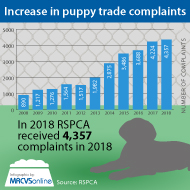RSPCA reveals staggering rise in puppy farm reports

Last year was the ‘worst yet’ for complaints about the puppy trade in England.
Reports about puppy farms have risen 390 per cent over the last decade, according to new RSPCA figures.
The animal welfare charity says 2018 was the ‘worst yet’ for complaints about the puppy trade in England. It received 4,357 complaints to its emergency hotline last year - a 390 per cent increase on 10 years ago when it took just 890.
With the gowing problem of the puppy trade, the RSPCA is reiterating its call to prospective dog owners to consider adopting a rescue pet.
“It is distressing that we are still seeing so many reports about puppy farms but part of this increase is probably due to people being more savvy about what to look out for when getting a pet,” commented RSPCA dog welfare expert Lisa Hens.
“We know there’s a spike in people searching for puppies and buying dogs at the beginning of the school holidays but we’d urge families to carefully consider whether getting a dog is right for them.”
She continued: “If you do have the time and money for a dog then we’d urge you to consider rescuing instead of buying a puppy. Not only will this give a rescue dog a chance at finding his forever home but it’ll also save any potential heartache caused by unwittingly buying a dog from a puppy farm.”
The RSPCA figures also show there has been a year-on-year increase in puppy farms reports over the past decade. Greater London received the highest number of reports in 2018 (270), followed by the West Midlands (227) and Kent (217).
“After the RSPCA campaigned for years, the Government last year finally introduced tougher licensing regulations around the selling of animals - including breeding and selling dogs - which we hope will help crackdown on this multi-million-pound industry,” Lisa added.
“The Government has also committed to a ban on the third-party sales of puppies and kittens which, alongside tougher licensing conditions will also help to tackle puppy farms and dodgy dealers. However, we also need to educate the public to ensure that they only buy puppies from responsible breeders who prioritise the health and welfare of their dogs over profit.”



 The latest
The latest